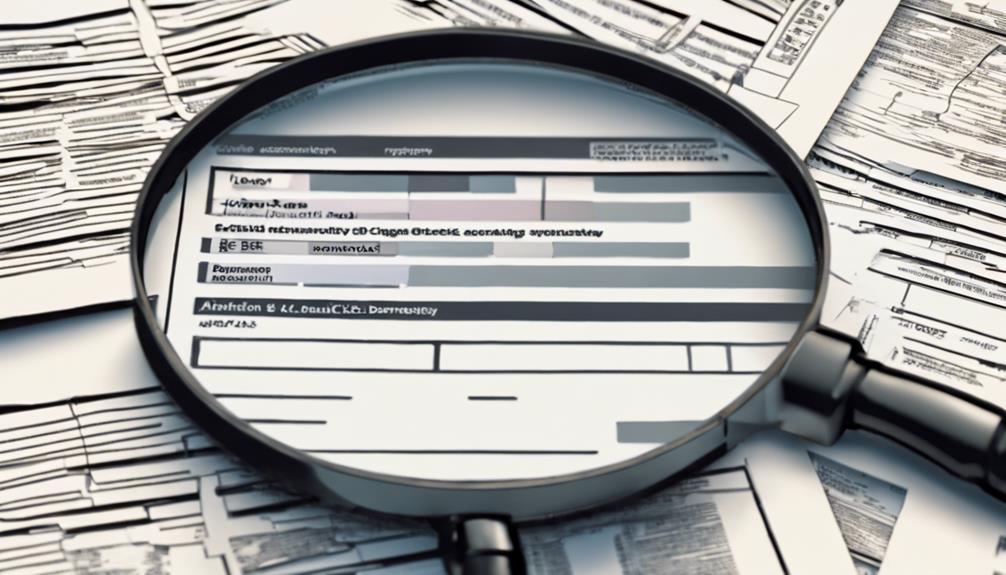In today’s competitive job market, the accuracy of Disclosure and Barring Service (DBS) checks is paramount for employer compliance. Ensuring that employees’ background checks are precise can significantly impact the safety and credibility of an organization.
However, the complexities of DBS checks and the repercussions of inaccuracies pose challenges for employers. By addressing these challenges through proactive measures and meticulous attention to detail, organizations can safeguard their reputation and maintain a culture of trustworthiness.
Understanding the nuances of DBS check accuracy is not just a matter of legal compliance but a fundamental aspect of building a secure and reliable workforce.
Key Takeaways
- Uphold legal requirements to avoid fines and criminal charges.
- Maintain accurate records for ethical hiring and liability protection.
- Preserve trust by prioritizing precise DBS screenings and compliance.
- Mitigate risks, ensure transparency, and foster a reliable work environment.
Legal Implications of False DBS Checks
In light of the potential legal repercussions associated with false Disclosure and Barring Service (DBS) checks, employers must prioritize accuracy in their screening processes to mitigate risks and uphold legal obligations.
False DBS checks can lead to severe consequences for employers, including fines and even potential criminal charges. Negligence in ensuring the accuracy of DBS check information can result in employers being held liable, especially concerning roles involving vulnerable individuals where safety is paramount.
By verifying the authenticity of DBS certificates, employers can prevent the reliance on falsified or altered information that may jeopardize the safety and well-being of those under their care.
Maintaining accurate DBS checks is not only a legal requirement but also essential for preserving trust with stakeholders. Therefore, it is imperative for employers to diligently verify and validate DBS information to ensure compliance with legal standards and safeguard against the risks associated with false disclosures.
Employer Responsibilities for DBS Accuracy
Employers bear the primary responsibility for ensuring the accuracy of information contained within Disclosure and Barring Service (DBS) check applications. It is incumbent upon employers to meticulously review and confirm the completeness and correctness of employee details before initiating the DBS check process. Failure to provide accurate or comprehensive information can lead to delays or inaccuracies in the screening process, potentially impacting recruitment timelines and organizational operations.
Employers are also required to maintain thorough records of DBS check results and adhere to stringent data protection regulations to safeguard sensitive information. By prioritizing accuracy in DBS checks, employers showcase a dedication to ethical hiring practices and the protection of their workforce. Ultimately, thorough verification of information not only streamlines the DBS checking process but also underscores an organization’s commitment to upholding regulatory requirements and fostering a safe working environment.
Impact of Inaccurate DBS Checks
Inaccurate DBS checks can have serious consequences for employers, including legal ramifications for wrongful hiring decisions and reputational damage.
These inaccuracies can also impact employee morale, leading to distrust within the organization.
Ensuring the accuracy of DBS checks is crucial to maintaining compliance standards and safeguarding both vulnerable populations and an organization’s integrity.
Legal Ramifications of Inaccuracies
When discrepancies arise in Disclosure and Barring Service (DBS) checks, the potential legal implications for organizations can be substantial. Inaccurate DBS checks can lead to fines, penalties, and other legal consequences, jeopardizing the organization’s compliance status and financial stability.
Moreover, non-compliance with DBS check accuracy requirements may result in legal actions that tarnish the reputation and credibility of the employer. Mistakes in DBS checks can have far-reaching effects, potentially leading to wrongful hiring decisions that put vulnerable populations or sensitive environments at risk.
Therefore, ensuring the accuracy of DBS checks is crucial for organizations to uphold trust, integrity, and legal compliance.
- Fines and penalties
- Legal actions
- Risk to vulnerable populations
Reputational Damage to Employers
In light of the potential legal ramifications associated with inaccuracies in Disclosure and Barring Service (DBS) checks, the reputational damage to employers stemming from such inaccuracies cannot be understated. Employers risk losing trust, credibility, and public perception if they rely on false DBS information. This damage can lead to negative publicity, tarnishing the employer’s brand image. Moreover, facing employee disputes, litigation, and financial losses due to inaccurate DBS checks can further harm an employer’s reputation. Ensuring the accuracy of DBS checks is crucial for maintaining a positive image within the workforce and the community.
| Impact of Inaccurate DBS Checks | |
|---|---|
| Loss of trust and credibility | Negative publicity |
| Legal consequences | Damage to employer brand |
Impact on Employee Morale
Employee morale is significantly impacted by inaccuracies in DBS checks, leading to detrimental effects on workplace dynamics and individual well-being. Inaccurate checks can result in wrongful rejections or dismissals, affecting job opportunities and causing feelings of unfair treatment or stigma among employees. This can lead to a decrease in confidence, emotional distress, and strained relationships within the workplace. Ultimately, such inaccuracies can erode trust, satisfaction, and productivity.
Resolving these issues promptly and transparently is essential for maintaining a positive work environment and ensuring that employees feel valued and supported.
- Wrongful rejections and dismissals affecting job opportunities
- Feelings of unfair treatment or stigma among employees
- Strained relationships, decreased trust, and productivity
Ensuring DBS Check Precision
With a focus on meticulous attention to detail, ensuring precision in DBS checks is paramount for employers seeking to maintain compliance and make informed hiring decisions.
Employers bear the responsibility of providing accurate employee information when submitting DBS check applications to guarantee the screening process’s accuracy. Inaccuracies in the details provided can result in delays or errors in the DBS check results, potentially impacting the hiring process and leading to compliance issues.
Therefore, it is imperative for employers to double-check all information entered in the DBS application form to prevent any discrepancies or inaccuracies.
The precision in conducting DBS checks is crucial for employers to make well-informed decisions regarding the suitability of candidates for positions that mandate a criminal record check.
Mitigating Risks of Incorrect DBS Checks
To safeguard against the potential consequences of inaccurate DBS checks, employers must prioritize the implementation of proactive measures to mitigate the risks associated with erroneous screening outcomes. Inaccurate background checks can have severe implications, including hiring unsuitable candidates who may pose a threat to vulnerable groups, exposing the organization to legal liabilities, reputational damage, and financial risks.
To address these challenges effectively, employers should consider the following emotional triggers:
- Fear: The thought of unknowingly hiring a risky candidate can instill fear in employers, emphasizing the importance of accurate screening procedures.
- Uncertainty: Not being certain about the reliability of DBS checks can create a sense of unease and doubt, underscoring the need for robust validation processes.
- Empathy: Understanding the potential impact of inaccurate checks on vulnerable individuals can evoke empathy, driving employers to prioritize accuracy and thoroughness in screening practices.
Importance of Accurate DBS Screening
Accurate DBS screening is paramount for organizations to meet legal compliance requirements. Ensuring that they adhere to regulations and standards in their hiring processes.
Beyond mere legal obligations, precise screening establishes a foundation of trust and reliability within the workplace. It fosters a culture of transparency and accountability.
Legal Compliance Requirements
Ensuring precise DBS screenings is a fundamental aspect of legal compliance for employers, particularly in adherence to the Rehabilitation of Offenders Act 1974 and the Police Act 1997. Accuracy in DBS checks is crucial for making well-informed decisions regarding an individual’s criminal history.
Failure to maintain accurate and complete records can result in legal repercussions and compromise the safety and trust within the workplace. Compliance with these legal requirements is essential for safeguarding vulnerable populations and fostering a secure working environment.
Employers must prioritize the accuracy of DBS screenings to demonstrate their commitment to regulatory standards and ensure the reliability of the screening processes.
Trust and Reliability
Maintaining trust and reliability in the hiring process hinges heavily on the precision and thoroughness of DBS screenings within the framework of legal compliance requirements. Accurate screenings are essential as they ensure that employers make informed decisions based on reliable information.
By conducting precise checks, organizations can avoid the risk of hiring unsuitable candidates or overlooking potential threats to the workplace. Moreover, accurate DBS screenings play a crucial role in safeguarding vulnerable groups and creating a secure work environment.
Trustworthy screening processes not only enhance the organization’s reputation but also boost employee confidence in the hiring process. Therefore, prioritizing the accuracy and reliability of DBS checks is paramount for employers to uphold integrity and safety in their recruitment practices.
Risk Mitigation Strategies
To effectively mitigate risks associated with hiring processes, organizations must implement robust strategies for ensuring the precision of DBS screenings. Accurate DBS screening reduces the likelihood of hiring individuals unsuitable for roles involving vulnerable groups, safeguarding workplace safety. Inaccurate checks can result in legal liabilities and reputational damage, underscoring the importance of precise information in DBS checks for compliance.
Mitigating risks through accurate screenings not only protects employees and clients’ well-being but also shields against negligence claims and regulatory violations. By prioritizing the accuracy of DBS screenings, employers demonstrate their commitment to upholding standards and promoting a secure work environment.
- Enhances workplace safety
- Protects employee and client well-being
- Demonstrates commitment to upholding standards
Conclusion
In conclusion, maintaining accuracy in DBS checks is crucial for ensuring a safe and trustworthy work environment. Employers must adhere to legal requirements, take responsibility for the accuracy of checks, and mitigate the risks of inaccuracies.
By following best practices and working with reputable umbrella bodies, employers can contribute to a secure workplace and uphold compliance with regulations. Accuracy in DBS screening is essential for promoting a reliable and safe working environment.



